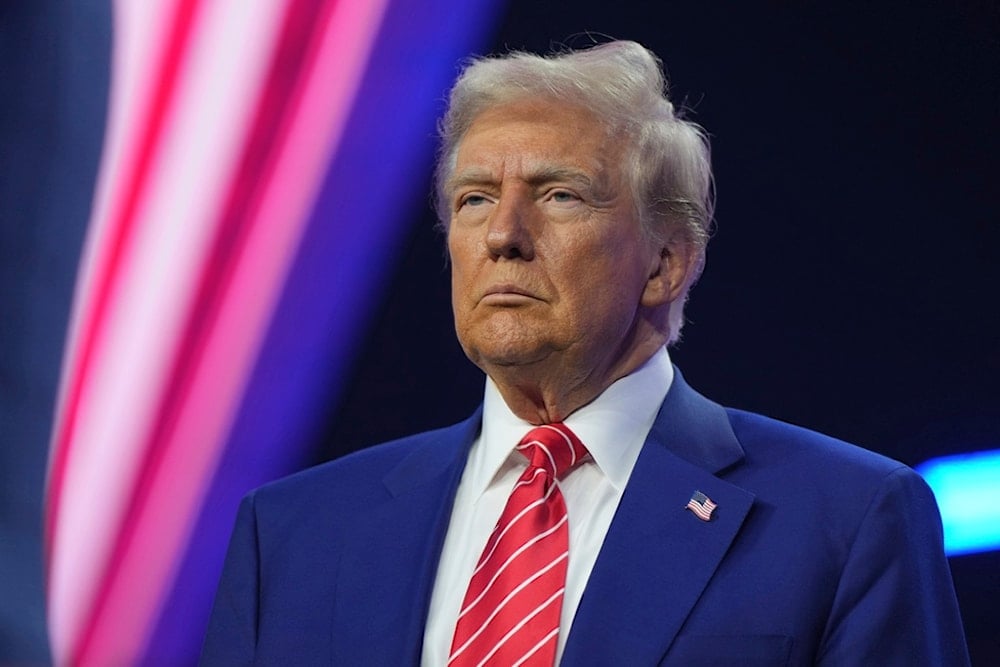Trump's provocative ambitions signal broader strategy shift: WashPo
Experts suggest Donald Trump's rhetoric ties into broader geopolitical concerns, particularly regarding China and Russia.
-

President-elect Donald Trump speaks at AmericaFest, Sunday, December 22, 2024, in Phoenix. (AP)
The Washington Post on Monday reported that President-elect Donald Trump has stirred global attention with remarks suggesting territorial ambitions and unconventional foreign policy moves ahead of his second term. Among his recent comments, Trump proposed purchasing Greenland, integrating Canada as the 51st US state, and claiming control of the Panama Canal—bold statements that have raised eyebrows internationally.
Despite not yet assuming office, Trump has defended these ideas as part of a broader "America First" strategy aimed at bolstering US power and influence. Trump's transition spokeswoman Anna Kelly declared, "When he officially takes office, foreign nations will think twice before ripping off our country, America will be respected again, and the whole world will be safer."
His proposal to acquire Greenland, a semiautonomous Danish territory, is not entirely new. In 2019, Trump explored the idea, prompted by Estée Lauder heir Ronald Lauder. Over the weekend, Trump reiterated this position on his social media platform, Truth Social, writing, "For purposes of National Security and Freedom throughout the World, the United States of America feels that the ownership and control of Greenland is an absolute necessity." Greenland's leaders, however, remain firm in rejecting the notion, with the island's prime minister previously stating it is not for sale.
Read more: John Bolton warns of global crises risk in Trump's upcoming term
Similarly, Trump's comments about the Panama Canal sparked controversy. Accusing Panama of overcharging shipping rates and claiming Chinese military presence in the region, Trump reignited a long-standing debate over US involvement. Panamanian President José Raúl Mulino dismissed these assertions as baseless, stating, "There are no Chinese soldiers in the canal, for the love of God. It's nonsense."
Geopolitical ambitions
Experts suggest Trump's rhetoric ties into broader geopolitical concerns, particularly regarding China and Russia. Ryan Berg of the Center for Strategic and International Studies noted growing unease over Beijing's influence on global shipping routes, including the Panama Canal. "There is worry about Chinese influence of the canal and the reliability of US operations," Berg said.
Critics, however, question the effectiveness and potential fallout of Trump's confrontational approach. Former representative Carlos Curbelo warned that such rhetoric could strain international alliances. "These kinds of insults could provoke them into a confrontation with the United States," he said, though he acknowledged that direct military conflict was unlikely.
Trump's administration appointments have further signaled a focus on Latin America, with Senator Marco Rubio named Secretary of State and former ambassador Christopher Landau as Deputy Secretary of State. Some of his selections, however, have sparked debate within conservative circles, with one adviser likening Trump's team to a "thunder dome."
Read more: Trump says will consider leaving NATO if allies didn't 'pay bills’
Observers have drawn parallels between Trump's positions and past US foreign policies. Historian Daniel Immerwahr noted that while Trump's territorial ambitions may seem out of place in the 21st century, they echo 19th-century imperialist tendencies. "None of this would have sounded weird in the 19th century," Immerwahr explained, emphasizing that Trump's direct approach diverges from the more cooperative diplomacy of recent decades.
This unpredictability in Trump's foreign policy is mirrored in the composition of his administration, where diverse perspectives and conflicting strategies create an environment of controlled chaos.
"You have a cast of characters that runs the gamut on what sort of advice they'll be proffering," a conservative foreign policy adviser who spoke anonymously told WashPo. "Trump goes beyond 'Team of Rivals,' to welcoming the thunder dome in some ways. … A lot of this seems paradoxical by design."

 4 Min Read
4 Min Read








